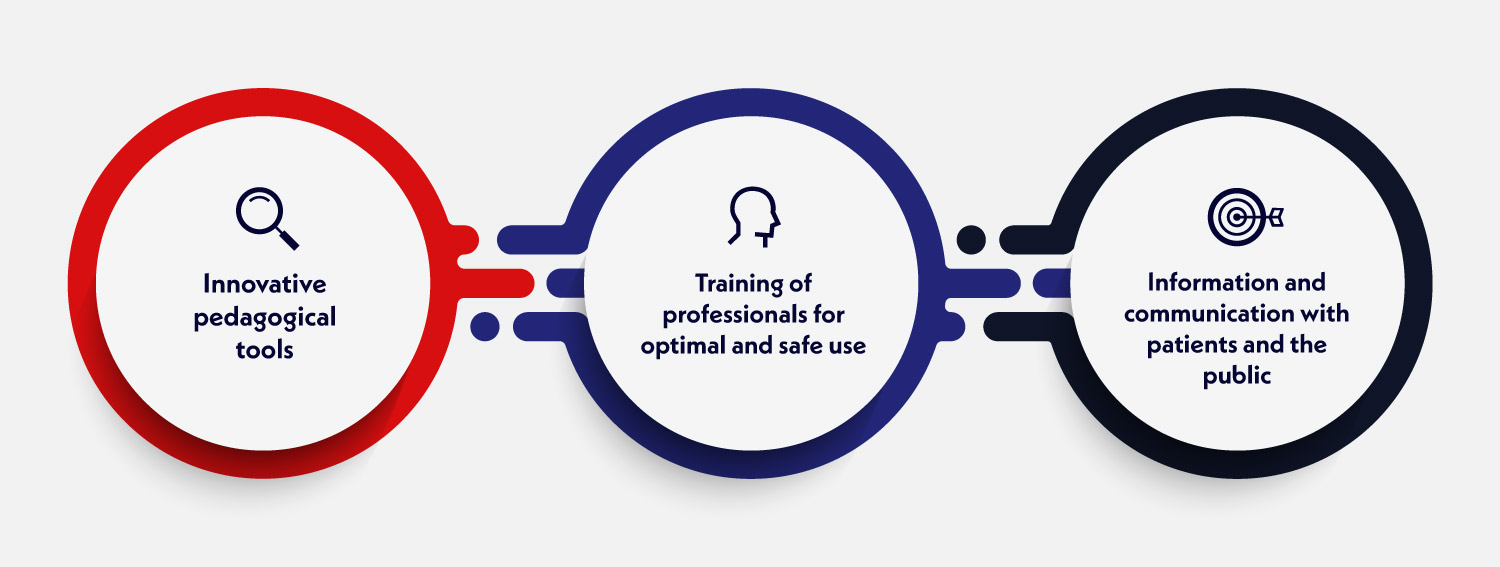AI for the education of health professionals
AI has the potential to address some of the challenges in education and training, and UNESCO is advocating for human-centered AI for all, enabling wider access to knowledge and innovation.
In healthcare, AI offers the potential to develop innovative teaching and learning practices, with for example the use of simulators that allow the operator to train safely in an environment that reproduces real conditions.
Various simulation centers have opened, particularly in the United States and Europe, and are now commonly used for training of medical students and paramedics. For example, the Harvard Medical Simulation Centre was established in 1994. It provided one of the first simulation mannequins and has helped train thousands of healthcare professionals for almost 20 years. In France, the Faculty of Medicine of Nice was among the first to equip itself with such technology in 2008 in partnership with Harvard Medical International. Demonstration videos of the platform are available on the following links:
These simulation centers have spread widely and are now available in many faculties of Medicine in France. The centers have improved over time and offer the opportunity for operators not only to interview and examine the virtual patient or mannequin, but also to train for complex technical procedures such as invasive examinations or surgical acts. In the field of vascular surgery, various cutting-edge centers have emerged to offer innovative academic simulation-based training programs for training of surgeons. In the United States, we can mention for example the vascular and endovascular surgery simulation center developed by Stanford University. In France, in collaboration with the University Hospitals of Strasbourg, GEPROMED (European Research Group on Prostheses Applied to Vascular Surgery) has also created a simulation center specialized for training in vascular and endovascular surgery.
In parallel with simulation centers, AI has brought new educational tools, thanks to the development of smart glasses or virtual/augmented reality head-mounted displays (see dedicated chapter). In addition, it has brought new techniques, such as Natural Language Processing (NLP), which can allow students to access more easily and more quickly to educational content adapted to their needs.
To learn more about the applications of AI for education and teaching in vascular diseases, you can read the following article: pubmed.ncbi.nlm.nih.gov/32279982/
Training of health professionals in AI
While AI offers applications directly used for the training of health professionals, a question that emerges is: “Are health professionals ready to integrate AI-derived applications into their medical practice? How will this implementation take place?” The training of healthcare professionals in AI is thus becoming a top priority to ensure that they master the principles of the techniques used to evaluate and use them efficiently and safely. Education and training of clinicians on the main principles of AI to understand their advantages and their limits is of utmost importance.
The National Strategy for Artificial Intelligence led by the French government emphasizes the need to deploy AI training, whatever the field, in order to train and attract talent to contribute to build a network of excellence among world-class institutions.
Universities have been actively involved to train health professionals in the fundamental principles of AI so that they can contribute to the deployment of AI in Health and benefit from the knowledge and expertise necessary to integrate it into their practice. Within the Université Côte d’Azur, a University Diploma has recently been created at the Faculty of Medicine of Nice involving AI professionals as well as specialized health professionals.
Other universities in France also offer training in “AI and Health” through various University Diplomas:
Patients and public education on AI applications in health
AI applications in health aim to optimize care and improve the management of diseases. The patients, their families and the public at large are at the heart of their development. It is essential that they are kept being informed of the latest advances in the field and to involve them in each step of the development of AI-applications so they can express their opinions and feedback. This is one of the major objectives that led us to create the arterIA website.
In France, the development of “La Maison de l’Intelligence Artificielle” (House of Artificial Intelligence) in Sophia Antipolis represents a major step forward in this direction. Initiated in 2018 and inaugurated in March 2020, the House of Artificial Intelligence is a first in France and in Europe. It is a public space, accessible to all, entirely dedicated to AI, which allows everyone to discover this technology and its applications in a wide variety of fields, including health. Supported by the University of Côte d’Azur and by “Communauté d’Agglomération Sophia-Antipolis et la Chambre de Commerce et d’Industrie Nice Côte d’Azur”, the House of artificial intelligence is fully in line with the dynamic of innovation and scientific sharing carried out by the 3IA Côte d’Azur Institute.
In collaboration with the House of artificial intelligence, the Institute Europe IA aims to bring together players in the field of AI and new technologies, to promote communication and dissemination of information, while placing the human being at the heart of Artificial Intelligence. The Institute Europe IA has organized numerous events, conferences and publications for anyone interested in AI. These events are available in replay and directly accessible on the website: https://institut-europia.eu/en/conferences/
Education, AI and Health: a triple challenge

The challenge of AI in health education is therefore threefold. While AI offers innovative educational tools used to train health professionals, it is reciprocally necessary to train these professionals for optimal and safe use of AI for tomorrow’s medicine.
Information and communication with patients and the public is the third element necessary for the development of fair and responsible AI in health. This is a fast-growing and extremely dynamic field in France and worldwide and we are convinced that AI will offer new applications to improve patients care, especially in the field of cardiovascular diseases.

